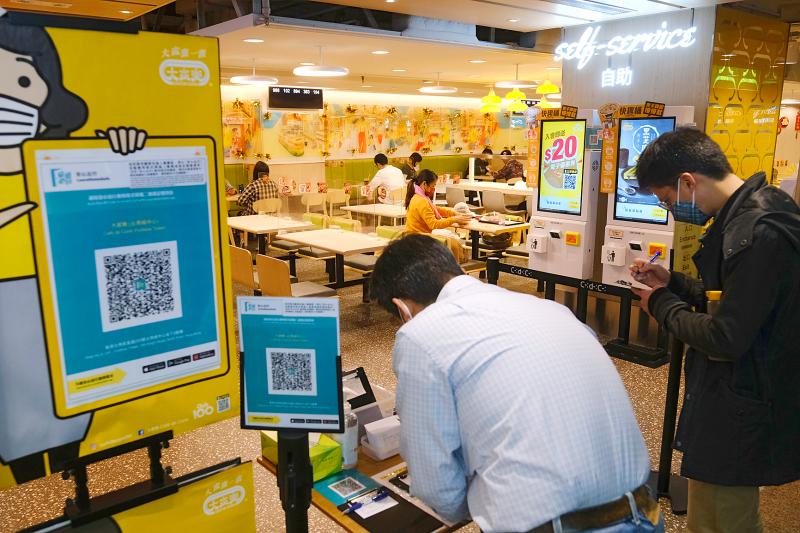Electronics shops in Hong Kong have seen a sharp increase in demand for cheap burner phones as the territory’s government eases restrictions amid the COVID-19 pandemic, but pushes the use of a contact-tracing app that has raised privacy concerns.
Pro-democracy protests erupted in Hong Kong in 2019 and a sweeping National Security Law was imposed last year by Beijing in response, along with the arrest of most of its prominent pro-democracy advocates.
The swift authoritarian turn taken by the government, which denies curbing the rights and freedoms of the territory’s 7.5 million residents, has resulted in deep-seated mistrust of public policies, including of measures to curb the pandemic.

Photo: Bloomberg
Hong Kong Secretary for Food and Health Sophia Chan (陳肇始) said that the app poses no privacy risks, as it only stores data on users’ phones and no third party collects them.
The app notifies users if they had been in the same place with a person confirmed with COVID-19.
“I’m buying a burner phone, because the government clearly doesn’t trust Hong Kong people, so why would I trust them?” said Vincent, 28, an accountant who gave only his first name because of the sensitivity of the issue.
In Sham Shui Po, more than a dozen vendors said that they have seen a spike in demand for old smartphones since last week, when the government announced plans to ease restrictions.
“People are just looking for a cheap smartphone that can run the LeaveHomeSafe app,” said Wong, a vendor at Phone House, who said she sold 50 phones in the past week, compared with the usual 10 or so per week previously.
Other vendors reported a three or four-fold increase in sales of cheap phones.
“I have seen a lot more people asking about and buying older phones over Chinese New Year,” said Andy Kwok of Ah Ling Telecommunications. “I have had to tell them the phone needs to be at least on Android 8 [for the app] to run.”
The most popular phone was the Samsung Galaxy J5, released in 2015, now selling for as little as HK$300 (US$38.70).
Meanwhile, newspaper publisher Jimmy Lai (黎智英) was again denied bail ahead of his April trial on charges of colluding with foreign forces.
Additional reporting by AP

Right-wing political scientist Laura Fernandez on Sunday won Costa Rica’s presidential election by a landslide, after promising to crack down on rising violence linked to the cocaine trade. Fernandez’s nearest rival, economist Alvaro Ramos, conceded defeat as results showed the ruling party far exceeding the threshold of 40 percent needed to avoid a runoff. With 94 percent of polling stations counted, the political heir of outgoing Costa Rican President Rodrigo Chaves had captured 48.3 percent of the vote compared with Ramos’ 33.4 percent, the Supreme Electoral Tribunal said. As soon as the first results were announced, members of Fernandez’s Sovereign People’s Party

EMERGING FIELDS: The Chinese president said that the two countries would explore cooperation in green technology, the digital economy and artificial intelligence Chinese President Xi Jinping (習近平) yesterday called for an “equal and orderly multipolar world” in the face of “unilateral bullying,” in an apparent jab at the US. Xi was speaking during talks in Beijing with Uruguayan President Yamandu Orsi, the first South American leader to visit China since US special forces captured then-Venezuelan president Nicolas Maduro last month — an operation that Beijing condemned as a violation of sovereignty. Orsi follows a slew of leaders to have visited China seeking to boost ties with the world’s second-largest economy to hedge against US President Donald Trump’s increasingly unpredictable administration. “The international situation is fraught

MORE RESPONSIBILITY: Draftees would be expected to fight alongside professional soldiers, likely requiring the transformation of some training brigades into combat units The armed forces are to start incorporating new conscripts into combined arms brigades this year to enhance combat readiness, the Executive Yuan’s latest policy report said. The new policy would affect Taiwanese men entering the military for their compulsory service, which was extended to one year under reforms by then-president Tsai Ing-wen (蔡英文) in 2022. The conscripts would be trained to operate machine guns, uncrewed aerial vehicles, anti-tank guided missile launchers and Stinger air defense systems, the report said, adding that the basic training would be lengthened to eight weeks. After basic training, conscripts would be sorted into infantry battalions that would take

GROWING AMBITIONS: The scale and tempo of the operations show that the Strait has become the core theater for China to expand its security interests, the report said Chinese military aircraft incursions around Taiwan have surged nearly 15-fold over the past five years, according to a report released yesterday by the Democratic Progressive Party’s (DPP) Department of China Affairs. Sorties in the Taiwan Strait were previously irregular, totaling 380 in 2020, but have since evolved into routine operations, the report showed. “This demonstrates that the Taiwan Strait has become both the starting point and testing ground for Beijing’s expansionist ambitions,” it said. Driven by military expansionism, China is systematically pursuing actions aimed at altering the regional “status quo,” the department said, adding that Taiwan represents the most critical link in China’s